
Cuadernos de Linguistica Hispanica
Scope & Guideline
Innovating Research in Hispanic Linguistic Studies
Introduction
Aims and Scopes
- Sociolinguistics and Language Attitudes:
The journal explores how social factors influence language use, including attitudes toward different varieties of Spanish, particularly in specific regions like Mexico and Colombia. - Translation and Language Policy:
It addresses issues in translation studies and the impact of language policies in bilingual contexts, highlighting the relationship between language and cultural identity. - Pedagogical Practices in Language Education:
The journal focuses on innovative teaching methodologies and the integration of technology in language education, aiming to enhance the learning experiences of future teachers and students. - Linguistic Variation and Dialectology:
Research on regional variations in Spanish, including phonetic, grammatical, and lexical differences, is a core area, contributing to the understanding of Hispanic dialectology. - Cultural and Discourse Analysis:
It examines the interplay between language and culture, particularly through discourse analysis in various media and cultural practices, reflecting on how language shapes and is shaped by societal issues.
Trending and Emerging
- Metalinguistic Awareness and Attitudes:
There is an increasing focus on how speakers perceive and evaluate their own languages and dialects, particularly in relation to identity and cultural heritage. - Technology in Language Education:
Emerging themes include the use of mobile learning and digital texts in teacher training, highlighting the impact of technology on pedagogical practices. - Cultural Representation and Media Discourse:
The analysis of language in media, particularly regarding social issues and cultural narratives, is gaining prominence, reflecting a growing interest in the role of language in shaping public discourse. - Interdisciplinary Approaches to Language Studies:
Research that integrates insights from various disciplines, such as psychology and sociology, to explore language learning and teaching is increasingly prevalent. - Sociophonetics and Variation Studies:
There is a rising interest in the sociophonetic aspects of Spanish, focusing on how social variables influence phonetic variation and speech patterns.
Declining or Waning
- Traditional Linguistic Theory:
There seems to be a decline in the publication of papers focused solely on traditional linguistic theory without application to real-world contexts or current sociocultural issues. - Historical Linguistics:
Research centered on historical aspects of the Spanish language and its evolution is becoming less common, with a greater focus shifting towards contemporary and applied linguistics. - General Linguistic Models:
Papers that propose broad, theoretical models of language without specific cultural or pedagogical applications are less frequently featured, suggesting a move towards more contextually grounded research.
Similar Journals
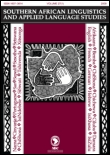
Southern African Linguistics and Applied Language Studies
Navigating Language Dynamics in a Diverse RegionSouthern African Linguistics and Applied Language Studies is a prestigious journal dedicated to the exploration and analysis of linguistics and applied language studies within the Southern African context. Published by Taylor & Francis Ltd, this esteemed journal has established itself as a significant platform for scholars and practitioners since its inception in 2003. With an impressive Q2 ranking in the Linguistics and Language category and a current Scopus rank of #430 out of 1167, it occupies a vital position in the academic landscape, appealing to a diverse readership keen on linguistic research, language policy, and applied linguistics. While the journal is not currently open access, it provides comprehensive insights and scholarly articles that foster understanding and innovation in linguistic practices and language education. As of 2024, the journal continues to deepen its impact through rigorous peer-review and a commitment to advancing knowledge, making it a key resource for researchers, educators, and students seeking to navigate the complexities of language within the Southern African region and beyond.
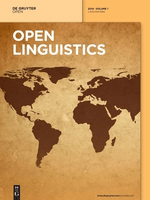
Open Linguistics
Connecting scholars and practitioners in linguistic exploration.Open Linguistics is a premier open access journal dedicated to advancing the field of linguistics, published by DE GRUYTER POLAND SP Z O O. Since its inception in 2014, the journal has consistently provided a platform for innovative research and critical discourse in various subfields of linguistics. With an impressive Q1 ranking in the linguistics category as of 2023, Open Linguistics is recognized for its significant contributions, ranking #223 out of 1088 in Arts and Humanities, as well as achieving a commendable #260 out of 1167 in Social Sciences. The journal's open access policy ensures that research is freely accessible to both scholars and practitioners, fostering a collaborative and inclusive academic community. With a focus on original research, reviews, and theoretical papers, Open Linguistics is positioned as an essential resource for researchers, educators, and students seeking to deepen their understanding of language and its diverse applications in society.

Studii de Lingvistica
Fostering innovation in linguistic studies.Studii de Lingvistica is a premier open-access journal committed to advancing the field of linguistics and language studies since its inception in 2011. Published by EDITURA UNIV ORADEA in Romania, this scholarly platform aims to disseminate high-quality research that encompasses various aspects of linguistics, encouraging contributions from researchers and professionals worldwide. With an impact factor that reflects its relevance, the journal holds a prestigious position in the Q2 category of Linguistics and Language for 2023. Despite its relatively nascent H-index, Studii de Lingvistica has carved a niche for itself, ranking 1017th and 1094th in Scopus across Arts and Humanities and Social Sciences, respectively. Researchers, scholars, and students alike will find valuable insights and pioneering studies within its pages, making it a vital resource for those engaged in the nuanced exploration of language and its cognitive dimensions. Located at UNIVERSITATII ST NO 1, PAVILION C, ORADEA, BIHOR, ROMANIA, this journal continues to foster academic dialogue and innovation within the linguistics community.
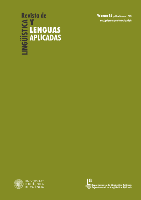
Revista de Linguistica y Lenguas Aplicadas
Advancing the Frontiers of Linguistic ResearchRevista de Linguistica y Lenguas Aplicadas, an esteemed journal published by UNIV POLITECNICA VALENCIA, EDITORIAL UPV, is a pivotal resource in the field of linguistics and applied languages. Since its inception, the journal has embraced Open Access publishing since 2006, ensuring that its rich repository of research is readily available to a global audience of researchers, academics, and language professionals. Headquartered in Valencia, Spain, the journal contributes significantly to the advancement of linguistics knowledge, boasting a respectable ranking within the Q3 quartile for Linguistics and Language (2023) according to Scopus metrics. It covers a diverse range of topics and methodologies, engaging readers through its commitment to scholarly rigor and innovation. The journal is uniquely positioned to inform and inspire essential discussions from 2015 to 2024, making it a vital platform for emerging linguists and seasoned scholars alike, as they explore the evolving landscapes of language and communication.

Al-Arabiyya-Journal of the American Association of Teachers of Arabic
Advancing Pedagogy and Scholarship in Arabic Language EducationAl-Arabiyya: Journal of the American Association of Teachers of Arabic, published by Georgetown University Press, serves as a significant platform for research and scholarship in the fields of Arabic language education, linguistics, and literature. With its ISSN 0889-8731 and E-ISSN 2375-4036, this journal presents a robust blend of original articles, reflections, and pedagogical research aimed at both seasoned educators and emerging scholars. While the journal is not an open-access publication, it maintains a commendable impact in its categories, achieving Q4 in Education and Q2 in Literature and Literary Theory as per the latest rankings. Notably, it has been recognized within Scopus for its contributions to the arts and humanities, with rankings that reflect a vibrant academic discourse surrounding the Arabic language. Al-Arabiyya aims to promote and enhance the teaching and learning of Arabic while fostering an understanding of its literary and cultural richness, making it an invaluable resource for anyone interested in Arabic studies.

Sprache & Sprachen
Advancing Knowledge in Language StudiesSprache & Sprachen is a renowned academic journal published by the Gesellschaft Sprache & Sprachen Gesus EV, focusing on the dynamic field of linguistics and language studies. With an ISSN of 0934-6813 and an E-ISSN of 2199-6016, this journal serves as a valuable platform for researchers and scholars to share innovative research, theoretical frameworks, and empirical studies related to language usage, structure, and evolution. Though it currently does not operate under an Open Access model, it maintains a robust reputation within the academic community, contributing significantly to ongoing discussions in linguistics. The journal's objective is to foster interdisciplinary collaboration and provide a forum for diverse linguistic perspectives, making it an essential resource for professionals and students alike who are keen on advancing their understanding of language phenomena. Located in Wuppertal, Germany, Sprache & Sprachen aims to engage the global academic audience by disseminating critical insights and encouraging scholarly discourse.
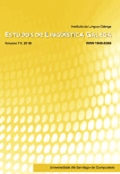
Estudos de Linguistica Galega
Exploring the Richness of Galician LinguisticsEstudos de Linguistica Galega, an esteemed journal published by the University of Santiago de Compostela, provides a critical platform for scholars engaged in the vibrant field of linguistics, particularly focusing on the Galician language and its surrounding linguistic phenomena. Launched in 2009, this Open Access journal enables unrestricted dissemination of research, facilitating engagement from a global audience. With an impact factor that positions it within the Q4 quartile in Linguistics and Language, it reveals a strong commitment to advancing the discourse in this niche. It ranks #691 out of 1088 in the Arts and Humanities category, underscoring its relevance in the academic landscape. The journal aims to foster collaboration and innovation among researchers and practitioners, making significant contributions to understanding linguistic diversity and its implications in contemporary society. Located in Santiago de Compostela, Spain, the journal encourages submissions that explore theoretical, empirical, and applied linguistic studies, thereby inviting researchers, professionals, and students to contribute to this growing field.

LFE-Revista de Lenguas para Fines Especificos
Advancing Language Education for Specific PurposesLFE-Revista de Lenguas para Fines Especificos is a distinguished academic journal focused on the field of applied linguistics and language education, published by UNIV LAS PALMAS GRAN CANARIA, SERV PUBL & DIF CIENT PARQUE CIENT. Established in 1993, this Open Access journal promotes the dissemination of research on specific purposes in language studies, making it an invaluable resource for researchers, educators, and students alike. Based in Spain, it serves an international audience interested in the intersection of language acquisition, pedagogy, and professional communication. Despite its recent entry into Scopus with competitive rankings in Social Sciences, particularly in Linguistics and Language and Education, the journal aims to continually enhance its impact by inviting innovative contributions that explore contemporary challenges and methodologies in language teaching and learning. Researchers are encouraged to tap into this growing repository of knowledge, which is easily accessible to foster collaborative and interdisciplinary dialogues within the field.

Linguas e Instrumentos Linguisticos
Fostering Academic Dialogue in LinguisticsLinguas e Instrumentos Linguisticos is a premier academic journal dedicated to the exploration and analysis of language and linguistic tools, published by RG EDITORA in collaboration with Universidade Estadual de Campinas (UNICAMP). With a focus on enhancing the understanding of linguistic structures and applications, this journal serves as a vital resource for researchers, professionals, and students interested in the dynamics of language within various contexts. Although currently not open access, it offers a wide array of scholarly articles that delve into innovative methodologies, theoretical frameworks, and empirical studies in linguistics. Operating out of São Paulo, Brazil, Linguas e Instrumentos Linguisticos fosters a rich academic dialogue and is committed to advancing the field of linguistic research, making it an essential read for anyone engaged in linguistic studies.
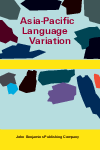
Asia-Pacific Language Variation
Analyzing the Dynamic Spectrum of Asia-Pacific LanguagesAsia-Pacific Language Variation is a prominent scholarly journal published by John Benjamins Publishing Co, dedicated to the exploration and analysis of linguistic diversity across the Asia-Pacific region. With its ISSN 2215-1354 and E-ISSN 2215-1362, the journal serves as a key resource for researchers and practitioners in the fields of linguistics and language studies. Since its inception in 2019, it has quickly ascended in stature, receiving a 2023 category quartile ranking of Q2 in Linguistics and Language and achieving impressive Scopus rankings, placing it in the 83rd percentile in Arts and Humanities and 81st in Social Sciences. Through its rigorous peer-reviewed articles, the journal aims to foster a deeper understanding of language variation, promoting interdisciplinary research and collaboration. Although it is not an open-access journal, the depth of research and critical insights offered in its pages make it an invaluable asset for academics, students, and professionals keen on the nuances of language within the dynamic Asia-Pacific context.